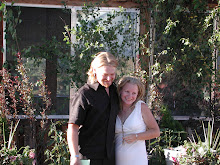Earlier this month I launched a food security initiative in my local area, and I know many of my readers are waiting for a report.
The good news is that interest in food security is widespread and strong. Dozens of people from across the West have contacted me with interest in this project, and dozens, if not hundreds, of food security initiatives are already underway across America.
Though the term may be vague, most people seem to have a general notion of the objective. Food security involves access to nutritious food on a daily basis, and the ability to weather supply shortages and infrastructure disruptions.
Plenty of food security assessments have demonstrated the problems of our consolidated, long-distance food supply structure, and advocated for a more decentralized, locally-based system. Thus, many food security programs emphasize farmers' markets, direct sales, community-supported agriculture, farm-to-school programs, small farm policy councils, producer-consumer cooperatives and other ideas.
I value these efforts and don't want to discount them in the least, but the bad news on food security is that we are working toward this goal with both hands tied behind our backs. The vast majority of Americans get their food at grocery stores, and until small farmers break through the retail access barriers, local food production will stay on the sidelines.
Significant resources have been expended to help small farmers jump regulatory hurdles so their products can sit on store shelves alongside the big guys. We have efforts to build commercially licensed community kitchens and USDA licensed mobile slaughtering units. There's even talk of ending subsidies to large agri-businesses so that small farmers can compete on a more level playing field, and occasional talk of no longer paying farmers not to farm.
In all of these efforts, we are on the slow, expensive track to food security. To be honest, this is just what I'd expect from a movement largely funded by USDA grant dollars. Agriculture's rule-making agency has had its "Time to Choose" and its "Time to Act," but the paradigm for small farmers has only worsened.
If we want food security in our lifetimes, much less before next winter, we need to start thinking outside the box of what's allowable to see what's possible.
I love farmers' markets, but why should farmers have to create their own markets? Why can't farmers get into stores? And if farmers aren't accessing stores, then what's in there?
This is supposed to be a free market economy, so let's imagine our legislators acted with the quickness they have occassionally been known to display, and let's say they put local, small-scale free trade on the fast track. It is within our politicians' powers to pass an emergency food security act to immediately bring small farmers back into their local grocery stores.
I'd start by allowing the meat processed in state-licensed facilities to be sold by the cut in grocery stores of that state. Direct sales are great, but too many people lack the funds or freezer space to buy a whole side or quarter of beef all at once. And it's not reasonable to expect people to criss-cross the countryside in search of food. If the meat processed in state-licensed facilities is safe to eat - and it clearly is - then it should be allowed in stores.
Next, I'd extend the regulatory exemption for farmers processing less than 20,000 birds annually, to create similar exemptions for small-scale producers of beef, pork, dairy and other animal protein sources. But 20,000 is an awful lot of birds, so I'd set a lower volume of sales to target family farms.
Finally, I'd put a free-trade zone around each small farm so the farmer could sell his products without regulation within a 50-mile radius of the farm. I guarantee you'd see a sudden and dramatic increase in local commerce between neighbors, and it might be just the shot in the arm that our economy needs.
But on the off-chance that our politicians are unwilling to act quickly, it's time for America's independent farmers, retailers and consumers to discover that their hands are only tied figuratively by unreasonable laws. In reality, our hands are free and we can join them with one another to create a new small farm union dedicated to building a local food supply structure.
Subscribe to:
Post Comments (Atom)

No comments:
Post a Comment